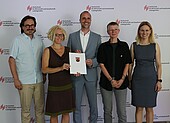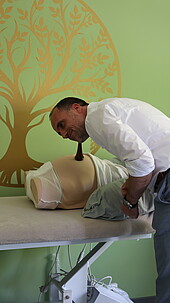The new cooperative research program "PRO.SOZIAL" deals withcrisis discourses and ways of dealing with social inequality andanalyzessocial transformations in the context of education and social affairs.The corresponding joint application by Ludwigshafen University of Business and Society (HWG LU) and Johannes Gutenberg University Mainz (JGU) in the "Rhineland-Palatinate Research Schools" funding line for the promotion of cooperative doctorates has now been approved: The Rhineland-Palatinate Ministry of Science and Health (MWG) is funding the project and thus the establishment of a total of five doctoral positions with a total of EUR 750,000 for a period of three years. For their part, the two participating universities are providing counter-financing in the same amount, resulting in a total funding volume of 1.5 million euros.
Ludwigshafen/Mainz, August 14, 2025: As part of his summer trip, Science Minister Clemens Hoch visited the Ludwigshafen University of Business and Society on August 13, 2025 and Johannes Gutenberg University Mainz today. In his luggage: the funding decision in the "Rhineland-Palatinate Research Colleges" funding line for the cooperative research project PRO.SOZIAL with a total financial volume of EUR 1.5 million from the MWG and the two universities.
PRO.SOZIAL deals with crisis discourses and ways of dealing with social inequality in the context of 'education and social affairs'. The joint project and the associated cooperative doctorates are being initiated and supervised by Prof. Dr. Marion Ott, Professor of Childhood Research and Social Work, and Prof. Dr. Karen Wagels, Professor of Psychology in Social Work, at Ludwigshafen University of Applied Sciences, and by Prof. Dr. Tanja Betz, Professor of General Educational Science with a focus on childhood research, and Prof. Dr. Karin Bräu, Professor of School Education with a focus on heterogeneity and inequality, at JGU.
"Since 2018, the Forschungskollegs Rhineland-Palatinate have funded two joint research projects between universities and universities of applied sciences each year and carried out cooperative doctoral procedures. This makes the research colleges an important instrument for the targeted promotion of young talent in the state and strengthens the research networks and thus our innovative power," said Minister Hoch at the presentation of the funding decision.
"We are very proud that we can specifically support our young researchers with the PRO.SOZIAL cooperative project between HWG LU and JGU as part of a research college. If I am correct, this is the first time since its establishment in 2018 that a project at the interface of social work and educational science has been funded and is an important signal for these socially important disciplines," said a delighted Prof. Dr. Gunther Piller, President of the HWG LU.
"The promotion of early career researchers is a particular concern of our university," emphasized Prof. Dr. Georg Krausch, President of Johannes Gutenberg University Mainz. "The state funding for the PRO.SOZIAL project makes us all the more pleased, as it focuses on an important social issue that affects our society as a whole. We are already looking forward to the results of the research work."
About the project: PRO.SOZIAL. Crisis discourses and ways of dealing with social inequality. Analyses of social transformations in the context of "education and social affairs"
Prof. Dr. Tanja Betz, Prof. Dr. Karin Bräu, Prof. Dr. Marion Ott, Prof. Dr. Karen Wagels
Wars and refugee migration, poverty and threats to democracy, the long-term consequences of the Covid-19 pandemic and the climate crisis - the current realities of (young) people are characterized by crises. Crisis discourses flank the situation in society as a whole, in which budgets are becoming scarcer, distribution struggles are intensifying and the gap between rich and poor population groups is widening - not least as a result of digital change. As a result, the needs and expectations of the education system and social work are increasing. At the same time, their scope for action is limited by a lack of financial and human resources.
The challenges that currently appear to be new are not fundamentally new in terms of their problems: capitalist societies have always produced processes of social exclusion and distribution struggles. These are intensifying in the face of welfare state and education policy restructuring in the context of activating reform policies - as can be observed in Western societies.
The research group takes these current social transformations, which are embedded in larger temporal welfare state frameworks, as a starting point for examining the diverse ways in which social inequality is dealt with in the context of multiple crisis discourses. The different ways in which these multi-layered social developments are processed - for example through digital technologies - are analyzed in the interplay of organizations, professions, interactions and actors. The project focuses on three research areas in particular in order to examine the multi-layered processes of processing and (re)producing social inequality and the efforts to reduce it:
- in the context of (digital) parental involvement and quality in schools and early education
- in the context of social space-related interventions
- in the context of integration assistance and social psychiatric services
In line with the research expertise of the research group participants, the social, organizational and psychological consequences of current developments for differently positioned (young) people will be investigated and how exclusion processes and social inequality are dealt with politically, professionally, institutionally and scientifically - not least through crisis discourses themselves.
Over the three-year term of the research college, the two participating universities will develop, implement and further develop a joint qualification concept for academics in qualification phases. In addition, cooperative doctoral supervision ("supervision tandem") and joint research in this area will be established and further expanded across universities.
Further information is available at:
Contact:
Ludwigshafen University of Business and Society
Department of Social and Health Care
Prof. Dr. Marion Ott, Professor of Childhood Research and Social Work
Prof. Dr. Karen Wagels, Professor of Psychology in Social Work
Email: marion.ott@hwg-lu.de / karen.wagels@hwg-lu.de
Johannes Gutenberg University Mainz
Department 02: Social Sciences, Media and Sport
Prof. Dr. Tanja Betz, Professor of General Educational Science with a focus on Childhood Research
Prof. Dr. Karin Bräu, Professor of School Education with a focus on Heterogeneity and Inequality
Email: tbetz@ 8< SPAM protection, please remove >8 uni-mainz.de / braeu@uni-mainz.de
https://www.erziehungswissenschaft.uni-mainz.de/




